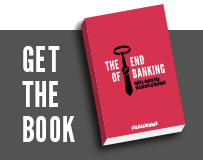In The End of Banking, we explain why banking regulation is no longer effective in the digital age. In particular, we highlight why the boundary problem of financial regulation has become insurmountable. But the boundary problem is not the only factor that inhibits the effectiveness of banking regulation.
Banks operating with razor thin equity ratios also take excessive risks with regard to legal sanctions -- for example, by ignoring rules that restrict analysts' involvements in IPOs. Although major investment banks paid $1.4 billion in 2003 to settle a dispute with the New York attorney general, they did not learn their lesson. In 2010, the same banks again broke the rules that are designed to manage the conflict of interest between research and advisory.
To make matters worse, the grip of banking over politics seems to be as strong as ever. Last week, the senate and congress passed a legislation that effectively expands government guarantees in the $700 trillion derivatives market. The large banks themselves drafted crucial parts of this legislation, and Jamie Dimon helped whipping the votes. These bold moves even surprised the vice chairman of the Federal Reserve, who noted that "we are two bad decisions away from not being an independent central bank.”
Last weeks' events further underscore that banking is out of control and that central banks are losing control.




